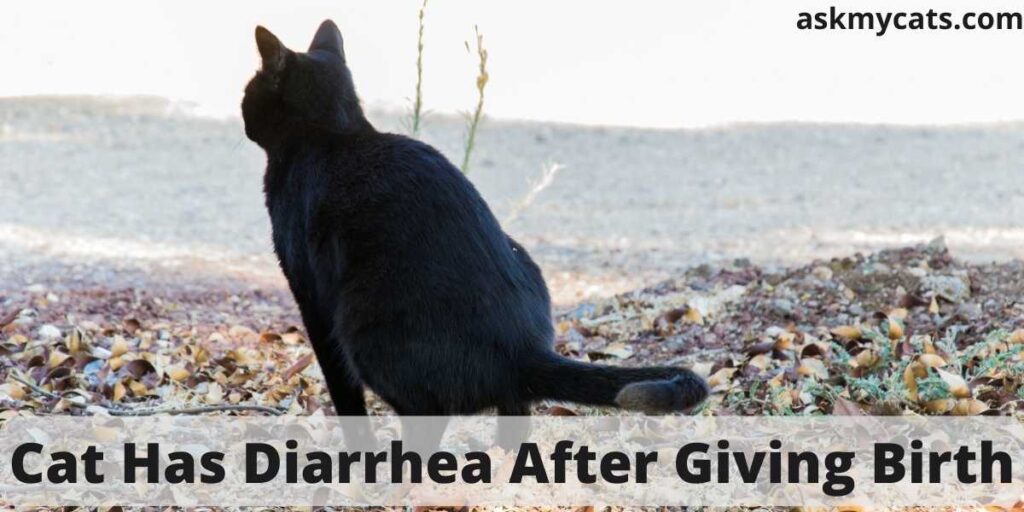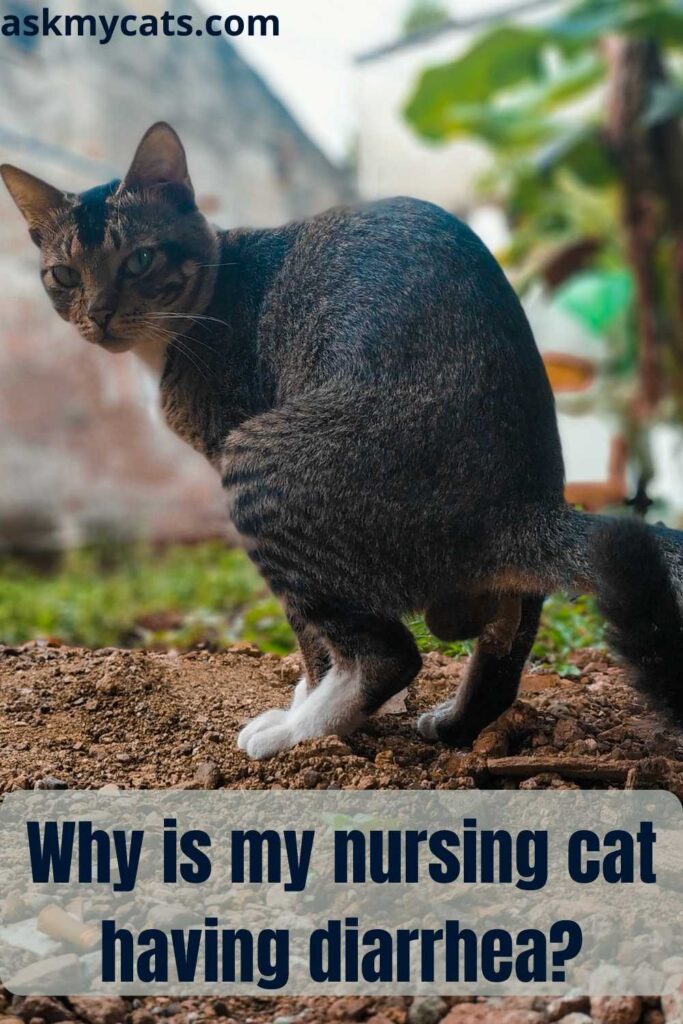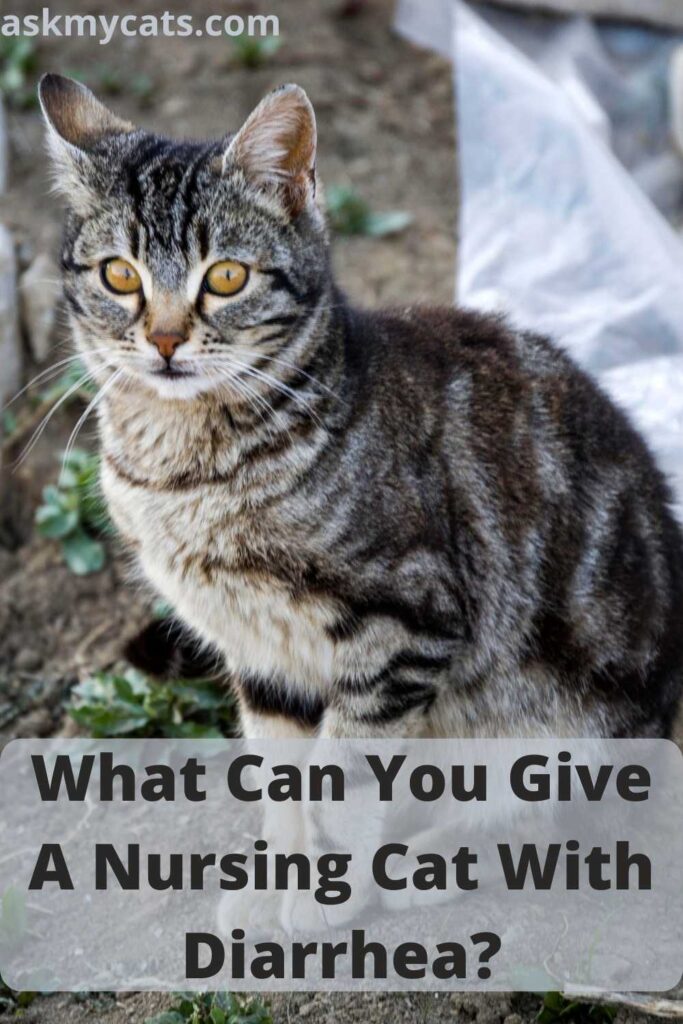Diarrhea can occur in both indoor and outdoor mother cats, as well as new mothers. If your cat exhibits additional symptoms of sickness, such as dehydration, weight loss, or pain, you must seek immediate treatment for his diarrhea.
Unless your veterinarian recommends it, you should avoid utilizing home treatments for severe diarrhea.
So, is it normal for a cat to have diarrhea after giving birth?
Yes, it is normal for a cat to have diarrhea after giving birth. Some diarrhea is typical after delivery, but if it persists for longer than two days, it is advised to take her to the veterinarian so they may give her medicine to treat diarrhea.
This article will tell you more about why your cat has diarrhea after giving birth.


Give Your Cat the Perfect Day
Get the Free Ebook!
Why Is My Nursing Cat Having Diarrhea?
Here are some reasons why your nursing cat is suffering from diarrhea: –

1. Change of Lifestyle
Mother cats need to go through a lot of changes both physical and mental during their pregnancy and birthing stage, so diarrhea is normal if it does not persist for more than two days.
Since she changed her diet and is now consuming any feces and urine when stimulating the kittens, some diarrhea is entirely acceptable.
To help firm up her stool, you can add some boiled white rice to her canned diet or give her 2 teaspoons of canned pumpkin per day.
There is no immediate need to have her checked by a veterinarian as long as she is feeding the kitten and acting normally, eating, drinking, and in all other respects.
At four weeks, we advise taking the mother and young children to the veterinarian. The kittens’ initial deworming will also take place at this time.
2. Diet
A frequent cause of mild and temporary diarrhea is a rapid change in diet or the addition of new food (or hunting/scavenging outside for food).
As the intestine adjusts to the new food, this frequently goes away.
The consumption of bad (decayed) meat by mother cats, especially those who venture outside, can occasionally result in diarrhea.
Many cats are intolerant of the lactose (sugar) in milk, for example, thus diarrhea won’t go away unless the diet is adjusted in these circumstances when certain cats are unable to stomach specific foods.
3. Infectious Causes
Cats can have diarrhea due to a wide range of various infectious pathogens.
These include bacteria (like Salmonella and Campylobacter), and viruses (typically causing moderate and temporary diarrhea, though some viruses, such as feline parvovirus, and feline leukemia virus, can cause serious, life-threatening sicknesses), and parasites (such as Giardia, Tritrichomonas and coccidia).
Younger cats are more likely to contract infectious diseases, which typically affect multiple cats in a home.
4. Dietary Allergy
Some cats may become allergic (hypersensitive) to something in their diet, usually a protein, though this is not particularly common.
Instead of being connected to a recent change in diet, this typically occurs after a meal has been consumed over an extended period of time.
5. Inflammatory Bowel Disease
This is a complicated range of conditions that cause cats to have chronic (long-term), intermittent, persistent diarrhea, and/or vomiting.
It is a rather common cause of chronic diarrhea and is connected to a significant amount of intestinal wall inflammation.
Also, check out Cat Vomiting After Giving Birth: Is It Normal?
What Can You Give A Nursing Cat With Diarrhea?
Here are some things you can give your nursing cat with diarrhea: –

1. Change Your Cat’s Food
There is no need to restrict food from diarrheal nursing cats.
In fact, doing so can impair the digestive tract’s ability to heal itself and put nursing cats at risk for hepatic lipidosis, a potentially fatal kind of liver illness.
However, it is recommended to keep your nursing cat’s diet as simple as possible.
Remove any treats or table scraps and concentrate solely on the core, nutritionally balanced cat food that you provide every day.
Whether you recently altered your nursing cat’s food, return to the prior diet and see if your cat’s diarrhea resolves.
One or more of the new food’s ingredients may irritate your nursing cat.
Even if you are feeding the same brand and type of food as before but have just opened a fresh batch, it may be worthwhile to purchase a new bag or case from a different lot number to eliminate the potential of contamination.
More chronic adverse food reactions can occur at any time—a nursing cat may have been eating the same food for years or may have recently switched to something different.
Many cats with food intolerances or allergies will find that eating a hypoallergenic or low-antigen diet relieves their symptoms.
The best low-antigen meals are only available via veterinarians, however, some nursing cats benefit from over-the-counter products. Look for diets that use unusual protein sources (e.g., duck or rabbit).
2. Fiber
A low-fiber (very digestible) diet can help some types of cat diarrhea. If your nursing cat doesn’t get diarrhea all that often but produces a lot of feces when he does, a low-fiber diet might be worth a go.
Look for feeds that claim to be highly digestible or suitable for cats with “sensitive stomachs.” On their guaranteed analyses, these items should have a crude fiber level of roughly 3%.
To further complicate matters, several kinds of cat diarrhea respond to fiber supplements, notably disorders that cause cats to “go” regularly yet only produce a little amount of excrement at a time.
Two readily accessible fiber supplements include unflavored psyllium (e.g., Metamucil) and canned pumpkin.
There are no hard and fast rules for how to dose psyllium or pumpkin in cats, but 1-2 teaspoons sprinkled into your nursing cat’s diet throughout the day is a good place to start.
3. Encourage Water And Electrolyte Intake
Nursing cats suffering from diarrhea must drink plenty of water to avoid dehydration. Maintain fresh, clean water in your nursing cat’s water dishes, and try adding an extra bowl containing diluted chicken or beef broth.
Switching your nursing cat from kibble to a canned feed is another simple approach to enhance his water intake.
You can also temporarily add an extra tablespoon or two of warm water to your cat’s canned food.
4. Probiotic
Normal digestion requires healthy bacterial populations in a nursing cat’s digestive tract.
When they are interrupted, a cat’s diarrhea may persist even after the primary shock (stress, sickness, antibiotic therapy, etc.) has subsided.
Probiotic pills can aid in the restoration of a nursing cat’s gut bacterial population. Choose a probiotic that has been labeled for use in cats and is manufactured by a trustworthy brand.
5. Anti-Diarrheal Medications
Most anti-diarrheal drugs should not be administered to nursing cats unless supervised by a veterinarian.
Some are outright harmful, but kaolin-pectin treatments can be given to nursing cats safely. Typical dosing guidelines are 1 teaspoon for 5 pounds of body weight every four to six hours.
Be advised that in the United States, several kaolin-pectin-containing products (e.g., Kaopectate) are now produced with additional components.
Also, check out Cat Bleeding After Giving Birth: Is It Normal?
Frequently Asked Questions
What is digestibility and why is it important in pregnant cats?
The amount of food absorbed by the cat’s body is measured by digestibility. High digestibility is necessary because pregnant cats’ energy requirements are quite high and there is less physical space in their tummy.
How to diagnose diarrhea in nursing cats?
Your veterinarian will determine the reason for your cat’s diarrhea by reading a complete medical history, performing a physical examination, and, in certain situations, collecting samples for laboratory testing. Document facts such as when diarrhea began, how regular it is, and what it looks like, as well as any changes made to your cat’s diet or environment.
When do I wean my kittens?
Weaning is usually done gradually. Most kittens start eating solid food between the ages of 3 and 4 weeks. Weaning should be finished between the ages of 6 and 10 weeks.
Final Words
If you notice that your cat who has just given birth has been suffering from diarrhea for more than 2 days, you must take her to the vet immediately and have the treatment started as soon as possible.
If you have any questions, ask us in the comments section.
Interesting Read: Pregnant Cat Vomiting: Reasons & Solutions
Also, Read: Pregnant Cat Diarrhea: Reasons & Solutions
